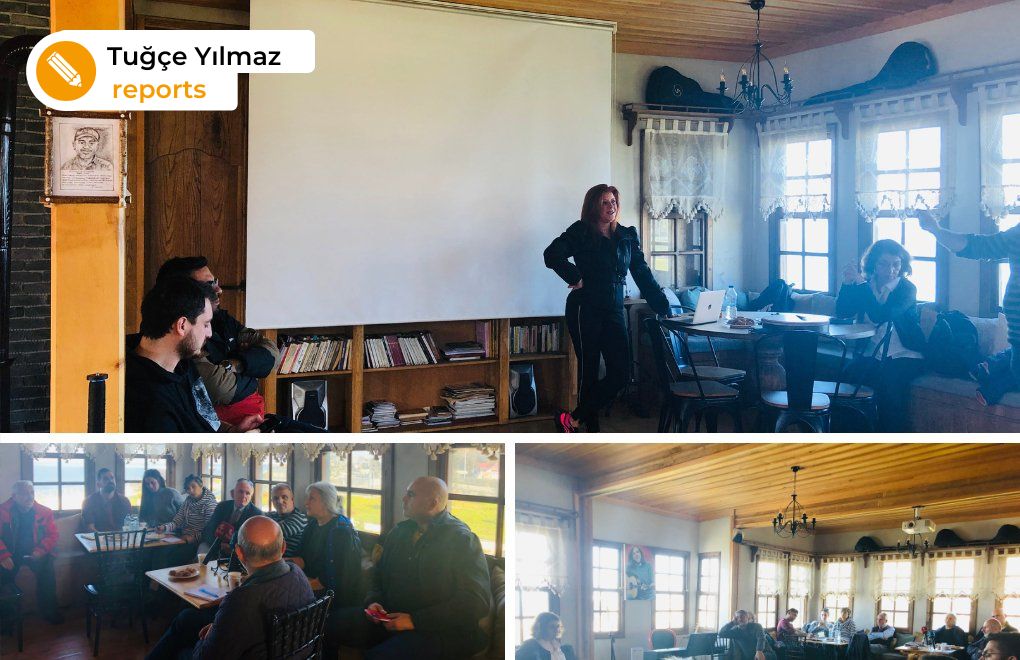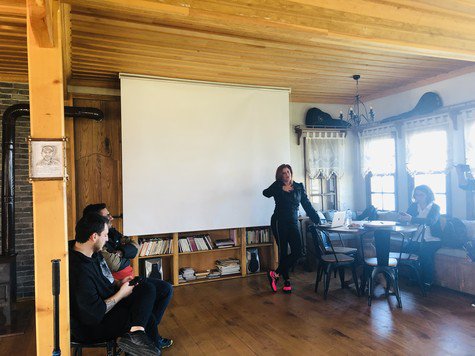Black Sea region environment organizations: "Either we will stop this destruction or we will be destroyed"

* Photos: Tuğçe Yılmaz / bianet
This article was published on the Atölye BİA (BİA Workshop) website
Click to read the article in Turkish
"Ecology Journalism Project" meeting organized in Fındıklı, Rize in order to strenghten the links between the local press and the non-governmental organizations in Rize started with Nazan Özcan from Atölye BİA/bianet speaking.
In the meeting at Kazım Koyuncu Culture and Art House, Özcan told the participants that the meeting was being organized in order to strengthen the relations between both local-national press and the environment organizations/institutions in Rize and gave the floor to journalist Pelin Cengiz.
Cengiz started by asking what ecology journalism was. She said that she started journalism with economy news, but that after the struggle against a hydroelectric plant in İkizdere 12-13 years ago, she headed towards ecology journalism.
An ever-changing sphere: Ecology journalism
Cengiz said that ecology journalism was an ever-changing and transforming sphere and that it encompassed a large area.
She then went on to say, "For me specializing in ecology journalism was a process that destroyed everything I had learned so far. All investments, as I learned making economy news, would help us to develop, and were good and beneficial for our country including coal-fired thermal power plants. In time I saw that there were ecology struggles all over Türkiye but there were also many problems. Thermal power plants, hydroelectric power plants, mines, mega projects, and airport projects were all being carried out at the same time."
Role of the locals
"However I remember how excited and how determined I was and I am thinking now: Why aren't the young journalists interested in ecology news? We have to think about this and discuss it. In fact, ecology problems can never be considered separately from economic and political problems.
Cengiz talked about how events in a local could be brought up even by a tweet and a short video. She said the locals had a critical role in ecology journalism and that sharing experiences was important for them.
Cengiz closed her speech by saying that it should be of priority when heading toward the elections to identify how ecology struggles and ecological destructions could be brought to the agenda of the opposition parties.

"Pillage" in every region
Representatives of environmental organizations and platforms involved in the ecology struggle took the floor after Cengiz.
The following were discussed in the first session:
Hasan Azaklı, Labor Party (EMEP) Hopa District Chairperson
"There is pillage in every region. We have to think over and over about the role of the local-national press in preventing this. In the local press, people say "Let me not stand out too much." Not all of them but this is the general attitude.
"At the moment there is a great problem, especially in Fındıklı and Arhavi about cage fish farming. People do not allow the EIA meeting to be held, however this time the authorities change the EIA regulation. They are trying to destroy our forests. City development plans are prepared in search of unearned income."
"We only concentrated on legal struggle"
Kamil Ustabaş, Hopa Community House/Halkevi:
"In the last years, we left behind active struggle and focused on legal struggles in our ecology problems. Since the judiciary's current situation is known, we have to develop another point of view.
"We have to develop new methods for our struggle opening new channels for people to participate. One of our first struggles was the one against hydroelectric power plants in the Fırtına valley in 1998. But when the struggle evolved into a legal one, we were distanced from the fight. Of course, the new political regime also has an effect."
.jpg)
Struggle for living spaces
Tuğba Yazıcı, Hemşin Life Association:
"The Blacksea region is a difficult region. It is the women doing labor-intensive work usually. Here is a struggle for living spaces waged by women. In this geography, you have to fight for women's and children's rights. Our association focuses on rural development.
"Because rural development is the key to the success of all other struggles. We want to wage an ecology struggle also. But we cannot do this in our local alone. In fact, we are waging a struggle for our living spaces here."
"Tablelands became vacant"
Hami Özçelik, retired teacher:
"There is a great pillage in Artvin. And 65 thousand mine licenses have been granted throughout Türkiye. The forests are now being sold together with mining licenses.
"Shephards practicing transhumance since generations now say 'I will be the last person to do this job in the family." Today tablelands became vacant and there is not one single spot in Artvin where there is no hydroelectric power plant."
"Three valleys were destructed"
Nur Neşe Karahan, Green Artvin Association:
"We have been struggling in Artvin almost since 30 years in order to protect our living spaces and to make our struggle known. Mining licenses have been granted in 75 percent of the lands of Artvin. Even our protected areas, rivers, forests, all areas were given mining licenses.
"Not only the mines, cutting down trees in forests, the hydroelectric power plants, and cage fish farming are the problems we are facing. Our Borçka dam lake changed color completely and became the Borçka swamp almost. Even the lockdowns during the pandemic were made use of for ecological destruction.
We have to speak up
"We are now only left with the farming areas of three villages. Yusufeli dam was the most significant effect causing the destruction. It destroyed almost three valleys. The people living in these villages were dispersed everywhere because their living spaces were removed.
"Of course, we also have some gains resulting from our struggles. But they sued hundreds of people during this process. The police who come to our press meetings shoot their cameras at my face. But we are not afraid and we ask people please not to be afraid. Yes, the situation is difficult and yes we have been muted at a time when we have to speak up. But we have to make a choice. Either we will stop this destruction or we will be destroyed."
.jpg)
Second session: Ecology journalism
The second session started with Pelin Cengiz's presentation on "how ecology journalism can be done." Participants discussed how the local press should pass the news to the national media and how ecology journalism should be carried out.
Cengiz said that good examples should also be highlighted in ecology journalism and emphasized that reports of gains in relation to ecological problems could motivate others to activism.
Daily heroism
Cengiz pointed out that a negative presentation of ecology news could also cause indifference on the side of the readers and said, "We have to look at the issue from a positive perspective. Our purpose should be to mobilize people through impartial, objective journalism. And of course to put pressure on some decision makers."
"It is important to prepare a success story when preparing the report. What kind of gain is there? What kind of a struggle has been waged? We call this daily heroism. A language of journalism set over people making a change in their villages, in their neighborhoods. News from the locals affects people more. A struggle here inspires another struggle in Türkiye or even in another part of the world.
Importance of storytelling
"Telling of the story is another thing. How did we learn about the issue at first, and how did we mobilize, it is necessary to tell the story of these and to describe them so people can visualize the events and the location.
"And of course experiences. Similar struggles in different regions have to come together. Another important issue is the follow-up on the news. What is happening in İkizdere now? I might not have an idea either. You should mobilize the journalists.
Who are the offenders?
"Another important issue is to name the offenders. Who is building these hydroelectric power plants? Are these projects being constructed in public-private partnerships? Is there a foreign-origin company? These are also important for you to know. Maps were drawn in the past, so we were able to see who is linked to who.
"We have to know the offenders, to be acquainted with them. Financial resources is another important issue. Who is funding these companies? Some are cutting down the trees but they do not come from outside. They are among us.
Concrete examples
"And of course supporting the news with scientific data. Numbers should not be flying about in order to prevent information pollution. Even if you are not in the field, you can take the opinion of a scientist who has worked in the field"
Cengiz ended her speech by saying that examples such as saying "an area as large as so many football fields" were good for people to be able to visualize the region of ecologic destruction.
Solidarity
Eren Atasoy, Fatsa-Ünye Environment Protection Platform:
"We are waging a non-stop struggle for our living areas for eight years. Since 2014, we have been organizing marches to mining areas. Setting up a 'resistance tent' in 2015, we were able to stop the activities of the mine for four years. They burnt our tent but in fact decline started for us from 2016 on.
In 2019 we established an association and analyzed the water. We discovered that the water sources of the region all had heavy metal pollution. We stopped all drilling in the Ordu Ünye line. We set up a hotline. The villagers, the mukhtars, and others, everybody informed everybody else when a foreign vehicle was seen. And we stopped these vehicles. Akbelen and Bergama movements helped us a lot. And we supported the Kazdağları movement. We are also doing our journalism by ourselves, we have an outlet called 'Fatsa Manşet.' So we, who are from Fatsa are everywhere.
Tea problem
Caner Odabaş, Blacksea in Rebellion Platform:
"I came across the ecology struggle with the fight against Kavaklı hydroelectric power plant in Arhavi in 2013. We have a tea problem here, related to a bad agriculture policy. Chemicals such as nitrogen manure are being used and they mix into rivers and drinking water.
"Yes we make our living mostly from tea but how far is tea production damaging our nature, we have to think about this. If it is us who live here, we have to have our say. We have to be both able to write a report for a newspaper and to cultivate."
After everybody spoke, a discussion was held on what kind of organization could be built for the Blacksea region and how could there be better cooperation between the ecologists and environment platforms.
| Participating organizations: Hopa People's House/Halkevi, Labor Party (Emep) Hopa, Şifa Heybesi, Hemşin Life Association, kuzeyteve, ANKA Haber Ajansı, Green Artvin Association, Fatsa-Ünye Nature Protection Association, Karadeniz in Rebellion Platform, Evrensel Newspaper, Fraternity of Rivers (Derelerin Kardeşliği) Platform (DEKAP), Haber Rize, Fındıklı Municipality, Labor Party (Emep) Fındıklı. |
* The IPS Communication Foundation/bianet's "Ecology Journalism Project" is supported by Oslo Metropolitan University Journalism and Media International Center (JMIC). As part of the project, we have so far organized a climate journalism workshop in İstanbul and published an article serious about ecology. (TY/PE)




.jpg)
.jpg)